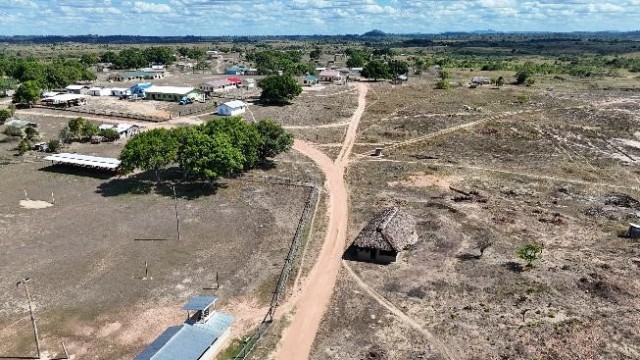The Amerindian villages of Nappi, Shulinab, Karaudaunau, and Awarewaunau in Region Nine are experiencing significant infrastructural upgrades, with internal roads transitioning from laterite to asphaltic concrete. This transformation is poised to offer substantial advantages to the local communities, particularly in mitigating the persistent dust problems associated with the existing laterite surfaces.
In December of the previous year, the PPP/C Government allocated $800 million towards these enhancements as part of a larger initiative aimed at improving infrastructure in remote hinterland areas and elevating the living standards of residents. A collaborative effort has been implemented, involving the Toshao, village councils, engineers, and contractors to identify and prioritize the most urgent areas for improvement.
According to a recent update from the Ministry of Public Works, work in Shulinab Village, located in South Central Rupununi, is currently 50% complete. The project, valued at $225.9 million, is being executed by Theodore Faria General Contracting Service. Presently, efforts are underway to stabilize the laterite in preparation for the Prime Coat application, with three culverts having been successfully installed.
Despite initial challenges—such as residents’ hesitance to relocate fences encroaching on the road and the need for slight realignments approved by the Village Council—progress is being made on schedule.
In Nappi village, also in Central Rupununi, road work is similarly at the halfway mark. This $149.3 million project is being carried out by Condor Construction Inc., which has already delivered culverts and is in the process of installation. The ministry reported that stabilization of the roadway is advancing ahead of the Prime Coat application.
In the Deep South, Karaudaunau Village is seeing a $185.2 million project that is also 50% complete, managed by Beerdat Harrinandan Construction & Transportation. However, some bridges along the Katoonarib to Karaudaunau route are in need of substantial repairs due to increased traffic from mining activities related to Marudi Mountain, necessitating the establishment of temporary bypasses.
The Awarewaunau project, valued at $249.3 million and executed by G&M Construction Inc., is at an earlier stage, having faced delays due to a late commencement. Nonetheless, surveying has been finalized, and materials are being mobilized for the next phases of work.
To promote transparency and encourage community involvement, the ministry’s engineers have provided unpriced bills of quantities to the villages, allowing residents to actively engage in the road construction process. This year, the government has allocated $9 billion for road development in hinterland areas.


